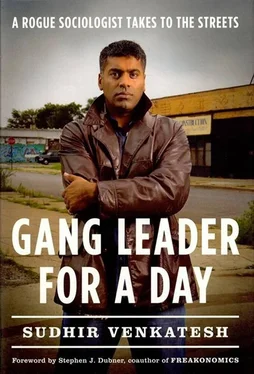“I’m old enough,” the boy said, insulted.
“You have to be eighteen,” the woman said with a gentle smile. “How old are you?”
“I’m Black Kings!” he cried out. “I can vote if I want to.”
“Well, you’ll probably have to wait,” the woman said, by now exasperated. “And, boys, I got food cooking, so I can’t talk to you right now. But if you come back, I can tell you all about voting. Okay? It’s probably the most important thing you’ll do with your life. Next to raising a family.”
“Okay.” Shorty-Lee shrugged, defeated.
The others also nodded. “Yes, ma’am,” one of them muttered, and they walked off. I waved good-bye to the woman, who smiled as if she’d won the victory of a small-town schoolteacher: a promise that her children would learn.
I followed Shorty-Lee and the others down the gallery. None of them seemed to know what should happen next. Shorty-Lee looked pained, struggling to muster some leadership capacity and perhaps save face.
“You know you can’t register people until five o’clock?” I said, wanting to break the silence. I was only a few years older than Shorty-Lee, but I found myself feeling strangely parental. “That’s what J.T. told me.”
J.T. hadn’t told me to say this. But I felt so bad for Shorty-Lee that I wanted to give him an out. I figured I could talk to him later, when we were alone, and explain how registration actually worked.
Shorty-Lee gazed out silently through the gallery’s chain-link fence.
“It’s about two-thirty,” I said. “That’s probably why the woman said what she said. You should wait awhile before knocking some more. You’ll get more people signed up if you wait. Why don’t we go to Ms. Turner’s and get some hamburgers? You can start again later.”
“Yeah, that’s cool,” Shorty-Lee said, looking relieved. “I’m hungry, too!” He started barking out commands. “Blackie, you got to get back home, though. We’ll get you some food. Kenny, hold my shit. Follow me. I’m getting a cheeseburger, if she still has any cheese left.”
They ran off toward Ms. Turner’s apartment, a makeshift store on the seventh floor where you could buy food, candy, soda, cigarettes, and condoms. I headed back to Ms. Mae’s apartment, trying to think of how to tell J.T. about this “voter-registration drive” without laughing.
The door-to-door canvassing was thankfully just a small part of J.T.’s strategy to politicize the gang. I began attending dozens of rallies in high schools and social-service centers where politicians came to encourage young black men and women to get involved in politics. Newspaper reporters often attended these events. I’m sure they were interested in the gang’s involvement, but their curiosity was also piqued by the participation of politicians like the Reverend Jesse Jackson, who urged young people to “give up the gun, pick up the ballot.”
J.T. told me he never wanted to run for office, but he was certainly attracted to the new contacts he was gaining through the Black Kings’ political initiatives. He talked endlessly about the preachers, politicians, and businesspeople he’d been meeting. J.T. knew that Chicago’s gangs were politically active in the 1960s and 1970s, pushing for desegregation and housing reform. He told me more than a few times that he was modeling his behavior on those gang leaders’. When I asked for concrete examples of his collaboration with his new allies, he’d vaguely say that “we’re working together for the community” or “we’re just trying to make things right.”
Perhaps, I thought, he didn’t trust me yet, or perhaps there wasn’t anything concrete to talk about. One of the few political activities I saw him directly manage was a series of educational meetings between Lenny Duster of Pride and various high-ranking Chicago gang leaders. Because the police rarely came around to Robert Taylor, it provided a relatively secure site for such meetings. This kept J.T. busy with providing security, keeping tenants out of the way, and otherwise ensuring a safe climate.
He firmly believed that the community would be stronger when the Black Kings entered the mainstream. “You need to talk about our political activities in your work,” he told me. “It’s part of who I am.”
But he also admitted that the “legit” image was vital to the gang’s underlying commercial mission: if law-abiding citizens viewed the gang as a politically productive enterprise, they might be less likely to complain about its drug sales. So J.T. continued to order his rank-and-file members to attend these political rallies, and he donated money to social organizations that called for gang members to turn their lives around. More than anything, I realized, J.T. was desperate to be recognized as something other than just a criminal.
I wasn’t sure that I believed him. I had trouble seeing exactly how the Black Kings were a useful group to have around. But they did seem to have a few noncriminal ventures, and perhaps, I thought, I would see more down the line. By this point I had gotten a reputation around the U of C as “the Indian guy who hangs out with the gangs.” In general this was a positive image, and I saw little reason to change things.
The more time J.T. spent with the citywide Black Kings leader-ship and their newfound political allies, the less time he had to escort me through the projects. This presented me with the opportunity I’d hoped for: getting to learn a bit more about the community for myself without J.T. watching over me.
Since I still wasn’t very familiar with the neighborhood, I didn’t stray too far from J.T.’s building. He had repeatedly told me that I wouldn’t be safe walking around other parts of Robert Taylor. The longer I hung around the projects, he said, the more likely that I would be associated with his gang. So I would do well to keep to the gang’s areas.
Strangely, while most people think of a gang as a threat, for me- an uninitiated person in the projects-the gang represented security. The courtyard in the middle of the three buildings that J.T. controlled was a closely guarded space. His gang members were everywhere: sitting in cars, leaning out of apartments, hanging around the playground and the parking lot. I didn’t know most of them well enough to strike up a conversation, but I was familiar enough to receive the local sign for “friend”-a slight nod of the head, perhaps a raised eyebrow.
I wanted to learn more about the gang’s influence on the greater community. C-Note and Clarisse had both suggested to me that the gang was simultaneously a nuisance, a source of fear, and an ally. But they were always a bit cagey.
“Oh, you know how J.T. is,” Clarisse once said to me. “He’s family, and you know what family is like.”
“Them niggers are wearing me out, but I ain’t gonna be the one to say nothing,” C-Note told me, “ ’cause they keep things safe around here.”
They tended to look at me as if I knew exactly what they meant, which I didn’t. But I was eager to figure it out.
I met the Johnson brothers, Kris and Michael, two Robert Taylor tenants known as expert car mechanics and consummate hustlers. They were both in their late thirties, skinny, with boyish faces, and they always had a positive outlook. Kris had been a promising baseball player until his career was ended by injury. Michael was a musician who’d never gained the level of success he sought. Now they both wanted good full-time jobs but couldn’t find steady work. Their lives had been an odyssey of drug addiction, street hustling, jail time, and homelessness. For them, and other underemployed men like them, the projects were a refuge: a familiar home turf with at least a few slivers of opportunity.
These days the Johnson brothers repaired cars in various parking lots around the Robert Taylor Homes. Although J.T. was the ultimate authority in the neighborhood, Kris and Michael also had to strike a deal with C-Note, who was the nominal ruler of the local auto-repair trade. Sometimes C-Note did repair work himself. When he was too tired, he subcontracted it out to people like the Johnson brothers. In return he took a small cut of their profits and let the gang know that the Johnsons were operating with his blessing.
Читать дальше












